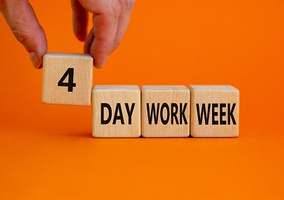Two charities that took part in the world’s biggest four-day week trial have now approved the setup permanently.
Scotland’s International Development Alliance and Debt Justice told Civil Society that they decided to stick with a four-day working week after staff reported improved wellbeing and decreased stress levels during the pilot.
The charities also said they had not seen a drop in their productivity since reducing employees’ working hours.
‘Hugely beneficial for staff wellbeing’
The four-day week trial was piloted in the UK between June and December last year by 61 organisations, including about seven charities, and around 2,900 workers.
Partaking organisations were not required to rigidly deploy a specific type of reduced working pattern or four-day week as long as they maintained pay at 100% and offered their staff a “meaningful” reduction in work time.
Friends of the Earth and the Royal Society of Biology both announced last year that they would make a permanent switch to reduced hours.
Scotland’s International Development Alliance, which has seven employees, said in February that it had extended the trial and was considering making a decision on a permanent move.
Its board has since approved the move, with six full-time staff members switching to a four-day week and one part-timer reducing their hours by 20%.
Chief executive Frances Guy said: “The Alliance is continuing with the four-day week with annual reviews to check that it’s still working for the organisation.
“It has been hugely beneficial for staff wellbeing, and has not affected our ability to meet objectives so we are happy to continue. We’re happy to share our experience with anyone interested.”
Moving towards ‘a fairer, wellbeing-based economy’
Debt Justice’s 12 employees all moved to a shorter working week after its board also approved the measure on a permanent basis.
Executive director Heidi Chow said that “adopting a shorter working week is our contribution to moving towards a fairer, wellbeing-based economy”.
“We have seen no drop in our effectiveness as a campaigning organisation. Instead, our staff are feeling more motivated and well rested which is having a positive impact on our work and campaigning outcomes,” she added.
Related articles










